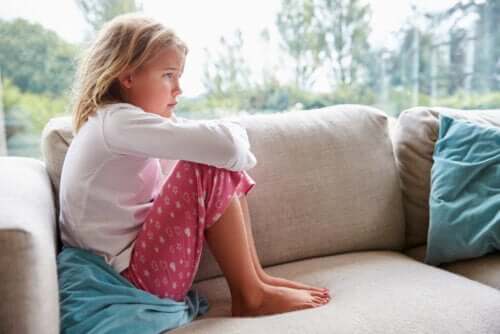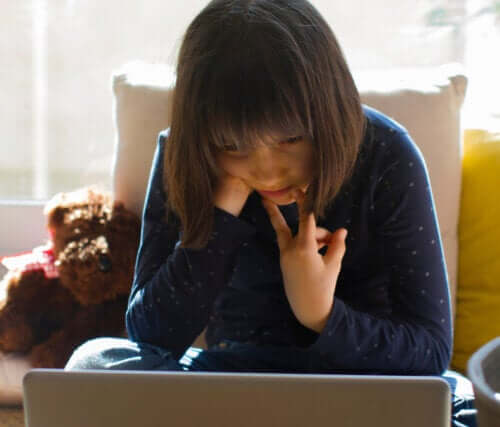The Effects of Confinement on Children

We can’t deny the fact that children have become an example of adaptation in the current situation we’re experiencing. But that doesn’t mean that it doesn’t affect them. In the article below, we’ll examine the effects of confinement on children.
The situation that the coronavirus crisis has produced is altering our day-to-day lives in major ways. And it’s clear that, to some degree or another, the pandemic will affect all of us. But, how do our current circumstances affect our little ones?
Confinement and children: Factors that can increase the negative effects
- Lack of interaction with their peers. This is one of the things that children are having to do without. Part of their normal routine before quarantine meant spending time with friends… at school, during outings to the park, etc. But now, those things aren’t an option.
- Uncertainty and instability. Children need certainty and stability in their lives in order to enjoy a healthy development. A lack of these conditions causes little ones to experience anxiety and distrust.
- The inability to go outdoors. Being able to move around outdoors… to run, jump, and play… is fundamental to children’s development and their ability to regulate their emotions. However, if children can’t get out, then they lack the space to do this – unless they have a home with a yard.

- Absence of habits and routines. Habits and routines help children regulate, and they’re very sensitive to these changes. Confinement has imposed an abrupt interruption in their routines, which has a greater impact on kids than on adults.
- The process of child development requires an environment for the regulation of emotions and behavior. If this environment changes, such as in our current circumstances, then children are likely to have a harder time regulating their behavior and feelings.
The effects of confinement on children
- Complaining of being bored.
- Difficulty managing their emotions.
- Increased irritability, causing them to become angry more easily.
- Oppositional behavior, refusal to follow instructions.
- Problems with eating and sleeping.
- Increased fears and occasional episodes of crying.
Preventing and responding to the effects of confinement

Maintain sleeping and eating schedules
It’s important to maintain these schedules and routines in order to prevent possible alterations in your children’s biological cycles.
Use the positive aspects of quarantine to your advantage
Use these aspects to help improve and compensate for the negative. For example, your children have more time to relax, be creative, play games with family, cook, etc.
Establish a daily routine of activities
Besides meals and bedtime, you should also organize a schedule regarding other everyday activities. For example, schoolwork, relaxation time, family time, chores, etc.
You should write your schedule down on a piece of poster board and hang it somewhere that everyone can see. If you have young children or children with disabilities, images can be more helpful than written words.
It’s important to limit the amount of time your children spend on digital devices (television, tablets, cell phones, etc). Establish times limits or times of day, according to age.

Try to incorporate activities that require movement
You can organize dance routines, obstacle courses, or any other indoor activity that keeps your kids moving. Of course, you should always provide parental supervision and make sure the activities work within the confinements of your home.
Keep in touch with friends and family
Let your kids make video calls to their friends, grandparents, cousins, etc. This will help to reduce their sense of isolation and offer them the opportunity to socialize with people other than those in their household.
Try to keep your own emotions from negatively impacting your children
Of course, as adults, we’re not exempt from the effects of the current situation. We know what’s going on and have our difficult moments. It’s not always easy to handle the emotions we experience, but we need to be careful about how we react in front of our kids. Even if you’re feeling discouraged or irritable, try not to transmit those feelings to your little ones or communicate with them in a negative way.
These are some of the effects of confinement on children. It’s clear that this situation affects some more than others, but we need to take care in order to reduce the consequences as much as possible.
We can’t allow ourselves to be worried and anxious around our kids, as this will only affect them even more. Fortunately, if you apply the advice we provided in today’s article, you’ll be able to reduce the effects of confinement.
We can’t deny the fact that children have become an example of adaptation in the current situation we’re experiencing. But that doesn’t mean that it doesn’t affect them. In the article below, we’ll examine the effects of confinement on children.
The situation that the coronavirus crisis has produced is altering our day-to-day lives in major ways. And it’s clear that, to some degree or another, the pandemic will affect all of us. But, how do our current circumstances affect our little ones?
Confinement and children: Factors that can increase the negative effects
- Lack of interaction with their peers. This is one of the things that children are having to do without. Part of their normal routine before quarantine meant spending time with friends… at school, during outings to the park, etc. But now, those things aren’t an option.
- Uncertainty and instability. Children need certainty and stability in their lives in order to enjoy a healthy development. A lack of these conditions causes little ones to experience anxiety and distrust.
- The inability to go outdoors. Being able to move around outdoors… to run, jump, and play… is fundamental to children’s development and their ability to regulate their emotions. However, if children can’t get out, then they lack the space to do this – unless they have a home with a yard.

- Absence of habits and routines. Habits and routines help children regulate, and they’re very sensitive to these changes. Confinement has imposed an abrupt interruption in their routines, which has a greater impact on kids than on adults.
- The process of child development requires an environment for the regulation of emotions and behavior. If this environment changes, such as in our current circumstances, then children are likely to have a harder time regulating their behavior and feelings.
The effects of confinement on children
- Complaining of being bored.
- Difficulty managing their emotions.
- Increased irritability, causing them to become angry more easily.
- Oppositional behavior, refusal to follow instructions.
- Problems with eating and sleeping.
- Increased fears and occasional episodes of crying.
Preventing and responding to the effects of confinement

Maintain sleeping and eating schedules
It’s important to maintain these schedules and routines in order to prevent possible alterations in your children’s biological cycles.
Use the positive aspects of quarantine to your advantage
Use these aspects to help improve and compensate for the negative. For example, your children have more time to relax, be creative, play games with family, cook, etc.
Establish a daily routine of activities
Besides meals and bedtime, you should also organize a schedule regarding other everyday activities. For example, schoolwork, relaxation time, family time, chores, etc.
You should write your schedule down on a piece of poster board and hang it somewhere that everyone can see. If you have young children or children with disabilities, images can be more helpful than written words.
It’s important to limit the amount of time your children spend on digital devices (television, tablets, cell phones, etc). Establish times limits or times of day, according to age.

Try to incorporate activities that require movement
You can organize dance routines, obstacle courses, or any other indoor activity that keeps your kids moving. Of course, you should always provide parental supervision and make sure the activities work within the confinements of your home.
Keep in touch with friends and family
Let your kids make video calls to their friends, grandparents, cousins, etc. This will help to reduce their sense of isolation and offer them the opportunity to socialize with people other than those in their household.
Try to keep your own emotions from negatively impacting your children
Of course, as adults, we’re not exempt from the effects of the current situation. We know what’s going on and have our difficult moments. It’s not always easy to handle the emotions we experience, but we need to be careful about how we react in front of our kids. Even if you’re feeling discouraged or irritable, try not to transmit those feelings to your little ones or communicate with them in a negative way.
These are some of the effects of confinement on children. It’s clear that this situation affects some more than others, but we need to take care in order to reduce the consequences as much as possible.
We can’t allow ourselves to be worried and anxious around our kids, as this will only affect them even more. Fortunately, if you apply the advice we provided in today’s article, you’ll be able to reduce the effects of confinement.
This text is provided for informational purposes only and does not replace consultation with a professional. If in doubt, consult your specialist.








